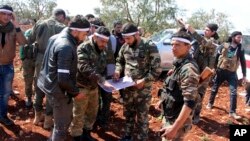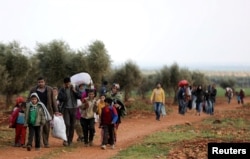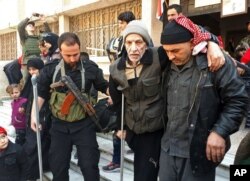Turkish forces shelled the Kurdish-held northern Syrian town of Afrin on Wednesday, killing at least seven people, Kurdish forces reported, as government shelling and airstrikes killed at least 20 civilians in the besieged eastern Ghouta enclave near Damascus, activists said.
Shells slammed into the heart of Afrin at dusk at intervals just second apart, forcing residents to rush for cover, according to video published by the People's Protection Units, known as the YPG. The group is being targeted by Turkey as a threat to its national security.
A resident reported a worsening bread shortage as tens of thousands of civilians have flocked to the town seeking relief from the advancing forces, shelling and airstrikes. Azad Mohamed said he waited in line at Afrin's only bakery for eight hours for a few loaves of bread. He said some residents were being turned away without any.
Afrin is already suffering from water and power shortages after Turkish forces cut supplies from the countryside, according to the Britain-based Syrian Observatory for Human Rights. Turkey has bombed several bakeries since launching its offensive January 20, according to the observatory.
Thousands of residents had already fled Afrin as the Turkish troops approached, heading toward nearby areas controlled by the Syrian government, but hundreds of thousands more remain trapped in the town as Turkish forces and supporting Syrian opposition fighters move to encircle it.
Turkish airstrikes killed at least eight pro-government militiamen, deployed to help the YPG, south of Afrin, according to the Kurdish military group.
A Facebook page of the Nubl and Zahraa villages posted photographs of the eight killed fighters, who were from the villages.
There was no comment from the Turkish or Syrian government.
Turkey had warned the Syrian government against aiding the Kurdish militia. Turkey launched its military offensive into the border region to drive out Syrian Kurdish forces that it considers to be "terrorists'' and an extension of Kurdish rebels fighting inside Turkey.
In the eastern Ghouta enclave, meanwhile, a doctor in Hamouria, which is inside the besieged zone, said his hospital had been overwhelmed with casualties and that for four hours ambulances could not move the wounded for care. He spoke on condition of anonymity out of fear for his own safety. At least 10 civilians were killed in Hamouria.
The Syrian Observatory for Human Rights and the Ghouta Media Center said the towns of Arbeen, Jesreen and Saqba were also targeted.
Recent government advances have cleaved eastern Ghouta into a northern and southern pocket. The bombing Wednesday focused on the south.
The Syrian Observatory for Human Rights and Syrian Civil Defense first responders, known as White Helmets, said Kfar Batna, a town in the southwestern corner of the enclave, had been particularly heavily bombed since Tuesday.
A video by the White Helmets shows rescuers rushing to a neighborhood in the town, scrambling to find survivors and unable to pick up the dead amid continuing bombing. A couple of women emerge from a cloud of smoke, walking over a pile of debris to get to the rescuers.
Two dozen civilians in need of medical care were evacuated from eastern Ghouta, the latest trickle of urgent cases to leave the area as government forces advance.
Local authorities in Harasta, also in eastern Ghouta, said they had been cut off from the rest of the rebel-held district, isolating 20,000 residents with no access to medical aid or supplies.
A spokesman for a medical charity said the isolation meant that Harasta and another cut-off pocket have not been able to send patients out in the evacuation.
A list of least 1,034 patients, including 72 urgent cases, for evacuation from eastern Ghouta has been drawn up, said Mohamad Katoub, of the Syrian American Medical Society, which oversees a number of medical facilities there.
The evacuation is part of a deal negotiated by the United Nations to allow urgent medical cases to leave the enclave for treatment. About 150 patients and their families left Tuesday.
Opposition activists say more than 1,100 civilians have been killed since government forces intensified their offensive in mid-February. An estimated 400,000 residents remain trapped in eastern Ghouta.







